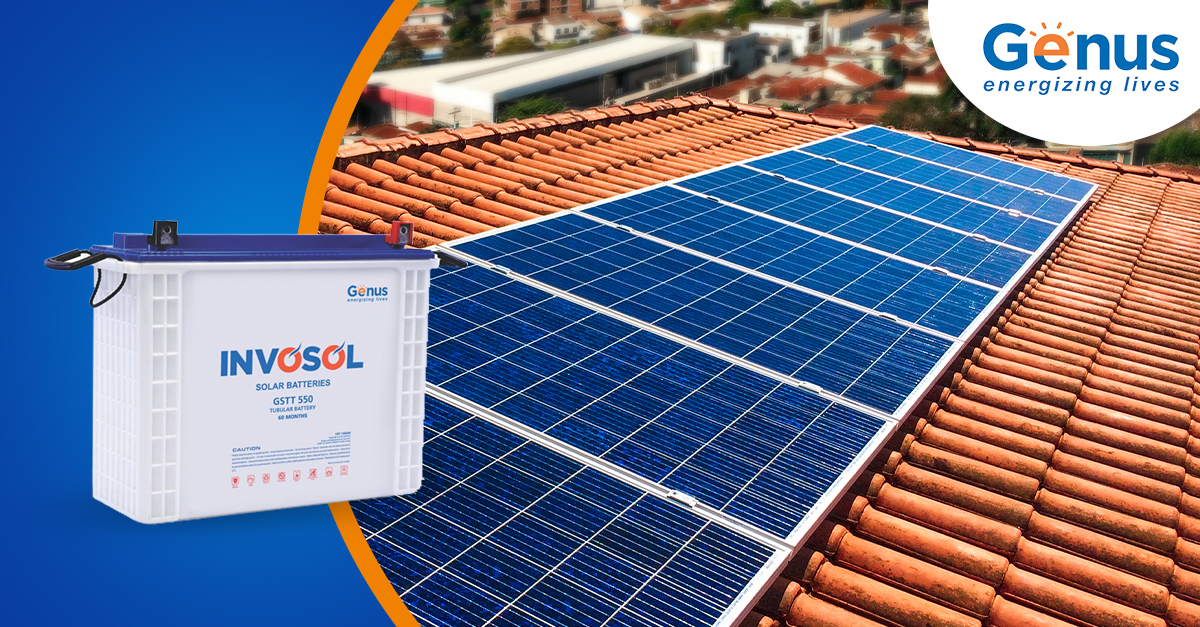
As per a report by the Solar Energy Industries Association, the demand for solar batteries has soared in the last few decades among both homeowners and businesses. This is largely a result of the unreliable power supply in the country and the fact that the existing ways of generating electricity are damaging the environment.
If you are one of those who are looking to use solar energy with maximum efficiency, you need the right battery to go with it. For that, you have come to the right place. With this comprehensive solar battery buying guide, you can rest assured that you are getting the maximum value for your money.

What is a Solar Battery?
A solar battery is a device that is charged by a connected solar system and stored for later consumption during nighttime, power outages, or even when the demand peaks.
What to Look for in a Solar Battery ?
-
Battery Capacity and Power
The battery’s capacity is measured as the total quantity of electricity that the solar battery can store. It is measured in kilowatt-hours (kWh)/ Ampere hour (Ah). Make sure you get solar batteries that are stackable. This means that you can use multiple batteries with your solar storage system to get enhanced capacity.
Another factor to look at is the power rating. Measured in kW, this metric tells you the amount of electricity that can be delivered by the battery at a given time. Notably, a battery with a high-power rating and low capacity can help you run your entire home albeit for a few hours. However, if you opt for a solar battery with a low power rating and high capacity, it will be enough to run a few appliances in your house for an extended period of time.
-
Depth of Discharge/ DoD
This is a measure of how much of the battery’s capacity can be used. Manufacturers specify a DoD because a solar battery needs to retain some charge at all times to deliver optimal performance.
For instance, if your manufacturer promised a depth of discharge of 90 percent for a 10 kWh battery, that means you will be able to use only 9 kWh before having to recharge it. Therefore, you need to look for a battery with a higher DoD.
-
Round Trip Efficiency
This is a measure of the amount of usable energy that the battery can deliver compared to the amount of energy it took in.
For instance, if you store 5kWh and get back 4kWh, the round trip efficiency is 80%., i.e., 4 kWh / 5 kWh.
Generally, you need to look for a battery that offers a high value of round trip efficiency due to the cost-saving benefits.
-
Battery Life and Warranty
Ensure that you get your solar battery from a manufacturer who provides the best warranty. For a solar battery, the warranty is specified in terms of the number of charging and draining cycles it will endure or the years it will function. So, the lifespan of a solar battery is determined by the brand and how much capacity it will lose over time.
-
Battery Type
There are three main types of batteries you can choose from. Let us go through those types and figure out which is best for you, based on their pros and cons.
1. Flow Battery
This uses a pumped electrolyte, such as vanadium ions or zinc bromide, and chemical reactions for storing and releasing the charge. The main advantage is that they will not lose their charge. Further, they are easy to recycle and can last over 10 years. However, since it is a new technology, it is expensive and harder to maintain.
2. Lead-acid
This is a more conventional and cost-effective option. However, these batteries often have a slow charge cycle and can be bulky, making them unsuitable for many common uses.
3. Lithium-ion
They are among the most used batteries since they are less likely to overcharge or get damaged easily. They can last well over ten years and can withstand a wide range of ambient temperatures. One of the only disadvantages is that they can be hard to recycle.
4. Tubular Batteries
Tubular battery is a type of lead acid battery that is normally quite large. Generally, they are used in Tier 2 and 3 cities where there are long power cuts. In India, these batteries are quite prevalent and come with a C10 rating, implying that they have great charging and discharging rates.The battery capacity is measured in Ampere hours.
Conclusion
Solar batteries are an investment that will continue to benefit you for years to come. Using these selection criteria, you can pick one that matches your power requirements perfectly and is cost-effective as well. To narrow down your search, you can pick from among the solar batteries manufactured by Genus, as they are designed to provide high performance and durability at a reasonable price.
